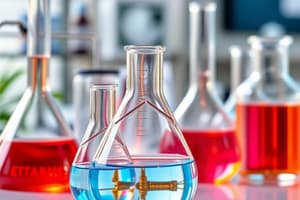Podcast
Questions and Answers
What is the definition of 'calculate'?
What is the definition of 'calculate'?
To give a numerical answer, where, in general working should be shown.
What does it mean to 'classify'?
What does it mean to 'classify'?
To group things based on common characteristics.
What does 'compare' mean?
What does 'compare' mean?
To identify similarities and differences between things or concepts.
What does it mean to 'construct'?
What does it mean to 'construct'?
Define 'describe'.
Define 'describe'.
What does 'discuss' entail?
What does 'discuss' entail?
What does 'distinguish' mean?
What does 'distinguish' mean?
What does it mean to 'evaluate'?
What does it mean to 'evaluate'?
Define 'explain'.
Define 'explain'.
What does 'identify' mean?
What does 'identify' mean?
What does 'infer' mean?
What does 'infer' mean?
What does 'investigate' involve?
What does 'investigate' involve?
Define 'list'.
Define 'list'.
What does 'measure' mean?
What does 'measure' mean?
What does 'outline' refer to?
What does 'outline' refer to?
What does 'predict' mean?
What does 'predict' mean?
Define 'recognise'.
Define 'recognise'.
What does 'relate' involve?
What does 'relate' involve?
What does 'show an appreciation' mean?
What does 'show an appreciation' mean?
What does 'show an awareness' entail?
What does 'show an awareness' entail?
Define 'show an understanding'.
Define 'show an understanding'.
What does 'state' mean?
What does 'state' mean?
Flashcards are hidden until you start studying
Study Notes
Glossary of Terms
- Provides definitions of scientific terms
- Definitions range from simple to complex
- Covers terms like calculate, classify, compare
Topic Outline
- Includes a table of contents with page numbers
- Covers all topics in the chapter
- From What is Science? to Representing Data
1.1 What is Science?
1.1.1 Perception of Science
- Explores how people understand science
- Examines the nature of science
1.2 Lab Safety and Apparatus
1.2.1 Safe Practices in Science
- Emphasizes the importance of safety in the lab
- Guides students on how to behave safely during experiments
1.2.2 Hazard Symbols
- Introduces symbols representing different types of hazards
- Helps understand potential risks associated with chemicals
1.2.3 Common Laboratory Apparatus
- Presents commonly used lab equipment
- Explains the function of each piece of equipment
1.2.4 Bunsen Burner
1.2.4.1 Parts of a Bunsen Burner
- Identifies the different components of a Bunsen burner
- Explains the purpose of each part
1.2.4.2 Safety Precautions when using a Bunsen Burner
- Provides safety rules for operating a Bunsen burner
- Key safety steps to prevent accidents
1.2.4.3 Types of Flames
- Introduces two types of flames: luminous & non-luminous
- Explains the characteristics and uses of each flame
1.3 How Do We Practice Science?
1.3.1 The Scientific Method
- Explains the systematic approach to scientific inquiry
- Steps include observation, hypothesis, experimentation, and conclusion
1.3.1.1 Identifying Variables
- Defines independent, dependent, and controlled variables
- Explains their importance in scientific experiments
1.3.1.2 Observation vs Inference
- Differentiates between observation and inference
- Emphasizes the role of both in the scientific method
1.4 Measurements
1.4.1 Physical Quantities & SI Units
- Introduces fundamental physical quantities
- Explains the International System of Units (SI) for measuring these quantities
1.4.2 Prefixes
- Introduces prefixes used with SI units
- Explains how prefixes change the scale of units
1.4.2.1 Unit Conversions
- Teaches how to convert between units of measurements
- Explains the use of conversion factors
1.4.3 Significant Figures
- Explains the concept of significant figures
- Emphasizes their importance in scientific calculations
1.4.4 Measurement of Length
1.4.4.1 SI Unit and Instrument
- Introduces the SI unit for length: the meter
- Explains how to use a metre rule and measuring tape
1.4.4.2 Precautions using Measuring Tape/Metre Rule
- Provides practical tips for accurate length measurements
- Explains where to position the zero point and avoid errors
1.4.4.3 Vernier Calipers
- Introduces Vernier calipers for measuring lengths
- Explains how to determine the measurement with precision
1.4.5 Measurement of Temperature
1.4.5.1 SI Unit and Instrument
- Introduces the SI unit for temperature: the Kelvin
- Explains how to use thermometers to measure temperature
1.4.6 Measurement of Time
1.4.6.1 SI Unit and Instrument
- Introduces the SI unit for time: the second
- Explains how to use different timekeeping devices
1.4.7 Measurement of Mass
1.4.7.1 SI Unit and Instrument
- Introduces the SI unit for mass: the kilogram
- Explains how to use a balance scale to measure mass
1.4.8 Measurement of Volume
1.4.8.1 SI Unit and Instrument
- Introduces the SI unit for volume: the cubic meter
- Explains commonly used instruments: measuring cylinders, beakers, flasks
1.4.8.2 Measuring Volume of Solids
- Explains methods for measuring volumes of irregular objects
- Examples: water displacement method
1.4.8.3 Measuring Volume of Liquids
- Explains how to read a volume of liquids
- Emphasis on avoiding parallax errors
1.4.8.4 Precautions when taking Volume Readings
- Provides practical tips for accurate volume measurements
- Explains how to avoid errors due to meniscus
1.4.9 Density
- Define density
- Explains the relationship between mass, volume, and density
- Describes the unit of density: kg/m3
1.4.10 Accuracy, Precision & Uncertainty in Measure
- Differentiates between accuracy and precision.
- Explains how to estimate uncertainty in measurements.
1.5 Representing Data
1.5.1 Recording Data
- Explains how to collect and record data properly
- Emphasizes the importance of organized and accurate record keeping
1.5.2 Tabulation of Data
- Explains how to organize data into tables
- Guidelines for creating clear and concise tables
1.5.3 Presentation of Data
1.5.3.1 Line Graph
- Explains the construction of line graphs to represent data
- Discusses the importance of axes labels and scales in line graphs
Studying That Suits You
Use AI to generate personalized quizzes and flashcards to suit your learning preferences.




